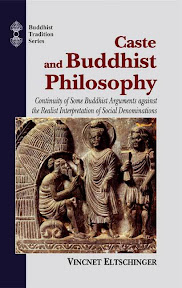Eltschinger: Caste and Buddhist Philosophy
Eltschinger, Vincent:
Caste and Buddhist Philosophy : Continuity of Some Buddhist Arguments against the Realist Interpretation of Social Denominations / Vincent Eltschinger. Transl. from French to English by Raynald Prevereau in collaboration with the author. - Delhi : Motilal Banarsidass, 2012. - xxi, 235 S. - (Buddhist Tradition Series ; 60)
Einheitssachtitel: "Caste" et philosophie bouddhique <engl.>
ISBN 978-81-208-3559-7
Rs. 500,00
US$ 22,75 (South Asia Books)
US$ 24,50 (D.K. Agencies)
DDC: 294.337
Beschreibung
From the sixth to the eighth century CE, the Buddhist philosophers paid considerable attention to the issue of the caste-classes. Far from seeking to reform the non-Buddhist social environment, they endeavoured to undermine theoretical attempts at "naturalizing" the social statuses, especially Kumarila's doctrine of the perceptibility of jati. Significant parts of their critique is strongly indebted to earlier, mainly canonical arguments shaped in order to neutralize the Brahmins' pride in caste. But closer scrutiny also reveals the innovations that were made possible by the renewal of Buddhist semantics around the so-called apoha ("exclusion") theory. Eltschinger's study presents the gist of the early Buddhist arguments, the modalities of their appropriation by later philosophers as well as the new developments induced by the epistemologists.
The rigorous denial by the Buddha and his followers of the Brahmanic idea of castes as a natural fact is a well-known detail in the long history of the study of India’s social structures and their ideological background. From early canonical texts to later philosophical literature, this denial is regularly attested.
The author offers a detailed analysis of the arguments against the Brahmanic ìnaturalization of caste, ”as propounded by Dharmakirti (ca. 600 CE) and his successors up to Prajnakaragupta (ca. 800 CE), and in the process pays close attention to their historical context as exemplified by the writings of Aryadeva, Vasubandhu, Dharmapala, and Candrakirti. The first section provides a survey of the canonical material in relevant Pali Suttas and subsequent Avadana and Jataka literature.
The main part of the book presents the final stage in the evolution of polemics against the “naturalization” of caste in the sense of “any attempt to include caste among the things that do not depend or proceed exclusively from human thought and arbitrary conventions, i.e., to consider caste as agreeing with nature and not merely with people’s social and linguistic habits”. This section focuses on the arguments of Dharmakirti. [Verlagsinformation]
Engl. Übers. von "Caste" et philosophie bouddhique : continuité de quelques arguments bouddhiques contre le traitment réaliste des dénominations sociales / Vincent Eltschinger. - Wien : Arbeitskreis für tibetische ud buddhistische Studien Universität Wien, 2000. - 204 S. - (Wiener Studien zur Tibetologie und Buddhismuskunde ; 47) (WorldCat).
Aus dem Inhalt
1. CANONICAL ANTECEDENTS
1.1 Outline of a Buddhist explanation. 1
1.2 Biological arguments: animal and plant species. 17
1.3 Genealogical arguments. 24
1.4 Unstable brahmanity. 49
2. DHARMAKĪRTI AND HIS SUCCESSORS
2.1 Before and around Dharmakīrti. 57
2.2 Context and problematic of Dharmakīrti's discussion. 94
2.3 Dharmakīrti against the class (jāti). 103
2.4 On the perceptibility of class (jāti). 116
2.5 Post-Dharmakīrtian developments of the argumentation. 137
3. CONCLUSIONS. 157
Autor
VINCENT ELTSCHINGER, Wissenschaftlicher Mitarbeiter am Institut für Kultur- und Geistesgeschichte Asiens, Österreichische Akademie der Wissenschaften, Wien. Profilseite.
Quellen: Motilal Banarsidass; WorldCat; D.K. Agencies; South Asia Books
Bildquelle: Motilal Banarsidass
Bibliographie: [1]
References
- (2012). Caste and Buddhist Philosophy: Continuity of Some Buddhist Arguments against the Realist Interpretation of Social Denominations. Buddhist Tradition Series; 60. xxi, 235 S.
Ähnlich
- Schmithausen: The Genesis of Yogācāra-Vijñānavāda
- Buddhism, Modernity, and the State in Asia
- Santideva and Bodhicaryavatara
- Nāgārjuna's Middle Way
- The Refutation of the Self in Indian Buddhism
- The Bodhisattva's Brain
- Ornament of Reason
- Buddhist Philosophy of the Middle
- Omniscience and the Rhetoric of Reason
- Twelve Examples of Illusion

